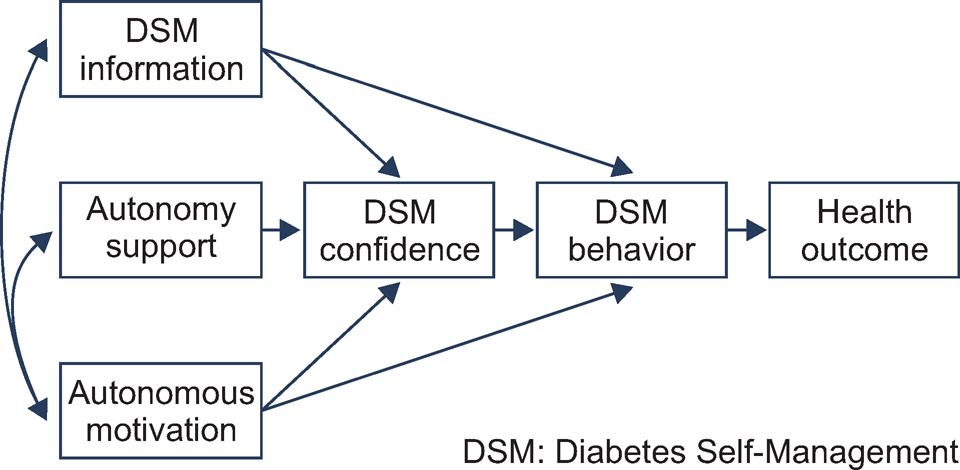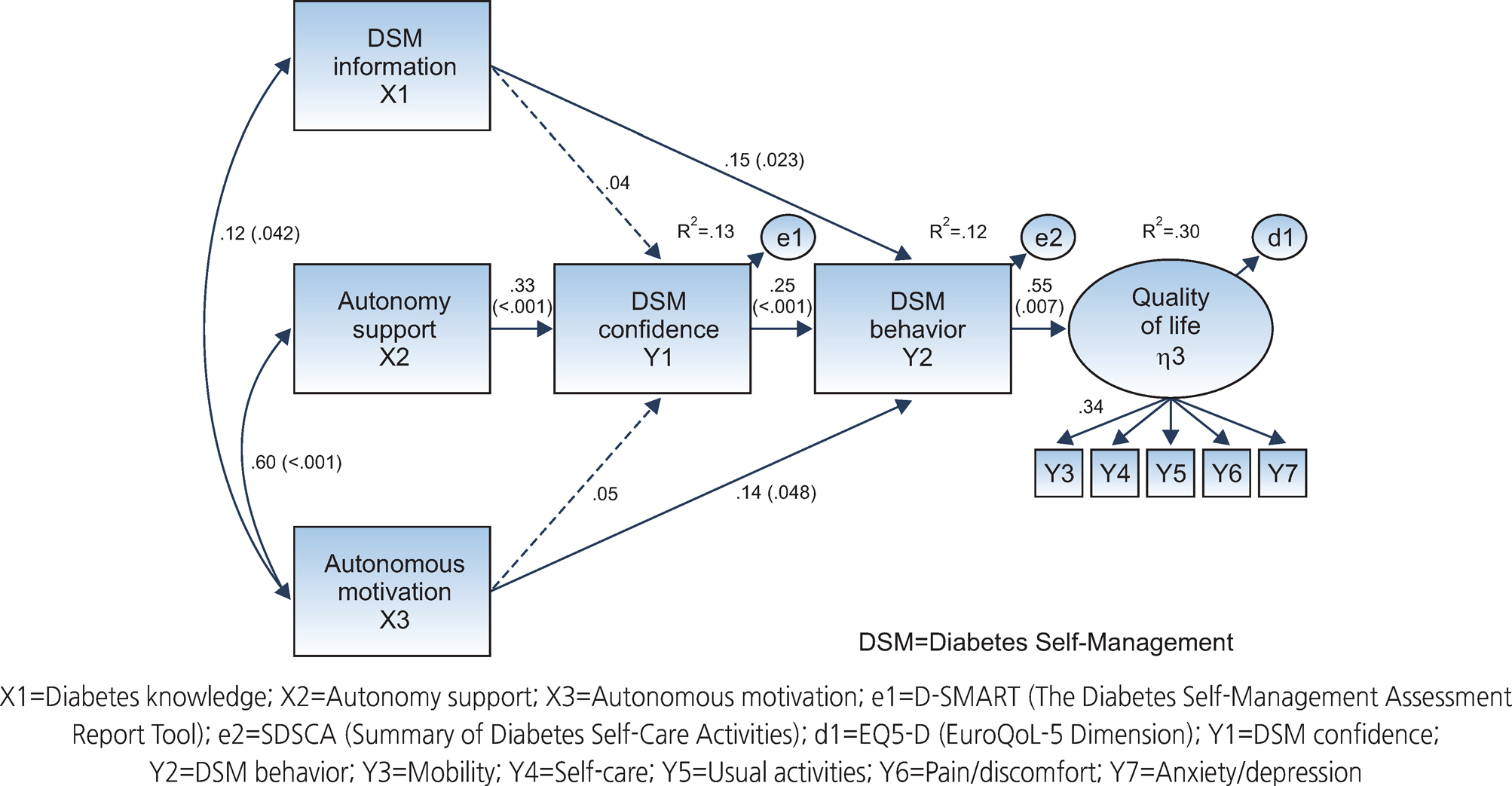J Korean Acad Nurs.
2017 Aug;47(4):514-525. 10.4040/jkan.2017.47.4.514.
Structural Equation Modeling on Self-Care Behavior and Quality of Life in Older Adults with Diabetes Using Citizen Health Promotion Centers
- Affiliations
-
- 1Department of Nursing, Chodang University, Muan, Korea.
- 2College of Nursing, Chungnam University, Daejeon, Korea. hlkim@cnu.ac.kr
- KMID: 2389027
- DOI: http://doi.org/10.4040/jkan.2017.47.4.514
Abstract
- PURPOSE
The purpose of this study was to construct and test a structural equation model for Diabetes self-management (DSM) behavior and Quality of life (QoL) in older adults with diabetes who use Citizen Health Promotion Centers. The theory used this study was a combination of the Information-Motivation-Behavioral Model (IMB) and Self-Determination Theory (SDT) to reflect autonomous characteristics of participants.
METHODS
Data were collected from April 20 to August 31, 2015 using a self-report questionnaire. The sample was 205 patients with type 2 Diabetes who regularly visited a Citizen Health Promotion Center. SPSS 22.0 and AMOS 22.0 programs were used to analyze the efficiency of the hypothesized model and calculate the direct and indirect effects of factor affecting the participants' DSM behavior and QoL.
RESULTS
The supported hypotheses were as follows; 1) The variable that had a direct effect on QoL was health behavior adherence (γ=.55, p=.007). 2) The variables that had a direct effect on DSM behavior were DSM information (γ=.15, p=.023), DSM confidence (γ=.25, p<.001), and autonomous motivation (γ=.13, p=.048). 3) The variable that had a direct effect on DSM confidence was autonomy support (γ=.33, p<.001).
CONCLUSION
The major findings of this study are that supporting patient's autonomous motivation is an influential predictor for adherence to DSM behavior, and integrative intervention strategies which include knowledge, experience and psychosocial support are essential for older adults with diabetes to continue DSM behavior and improve QoL.
MeSH Terms
Figure
Cited by 3 articles
-
Association of Resilience and Depression with Self-care Competence in Adult Patients with Diabetes Mellitus
Youngrye Park, Eun Hee Jang, Ji Ok Kim
Korean J Adult Nurs. 2018;30(5):555-564. doi: 10.7475/kjan.2018.30.5.555.The Effect of Basic Psychological Needs and Wisdom on Successful Aging in the Elderly
Min-Jeong Nam, Young-Mun Cho
Korean J Adult Nurs. 2018;30(1):70-78. doi: 10.7475/KJAN.2018.30.1.70.Health-related quality of life in female patients with reumatoid arthritis: a structural equation model
Bukyung Kim, Mi-Hae Sung
Korean J Women Health Nurs. 2023;29(2):91-103. doi: 10.4069/kjwhn.2023.06.05.
Reference
-
References
1. Korea Centers for Disease Control and Prevention. 2015 Health behavior and chronic disease statistics: Korea national health and nutrition examination survey·Youth health behavior online survey [Internet]. Sejong: Ministry of Health & Welfare, Korea Centers for Disease Control and Prevention;2016. [cited 2017 June 20]. Available from:. https://knhanes.cdc.go.kr/knhanes/sub04/sub04_03.do?clas-sType=7.2. Park YS, Ryu SH. Factors influencing quality of life in type II diabetes mellitus patients registered at public health center. Journal of Korean Community Nursing. 2002; 13(4):679–688.3. Riekert KA, Ockene JK, Pbert L. The handbook of health behavior change. 4th ed. New York, NY: Springer Publishing Company;2014. p. 87–108.4. Brody EM, Kleban MH, Moles E. What older people do about their day-to-day mental and physical health symptoms. Journal of the American Geriatrics Society. 1983; 31(8):489–498.
Article5. Chang S, Song M. The validity and reliability of a Korean version of the summary of diabetes self-care activities questionnaire for older patients with type 2 diabetes. Journal of Korean Academy of Adult Nursing. 2009; 21(2):235–244.6. Leventhal H, Diefenbach M. The active side of illness cognition. Skelton JA, Croyle RT, editors. Mental representation in health and illness. New York, NY: Springer-Verlag;1991. p. 247–272.
Article7. Osborn CY, Rivet Amico K, Fisher WA, Egede LE, Fisher JD. An information-motivation-behavioral skills analysis of diet and exercise behavior in Puerto Ricans with diabetes. Journal of Health Psychology. 2010; 15(8):1201–1213. http://dx.doi.org/10.1177/1359105310364173.
Article8. Deci EL, Ryan RM. Intrinsic motivation and self-determination in human behavior. New York, NY: Springer;1985.9. Seo YM. A structural model development for health behavior adherence in hypertensive or diabetetic patients [dissertation]. Daegu: Kyungpook National University;2008. p. 1–88.10. Magilvy JK. Quality of life of hearing-impaired older women. Nursing Research. 1985; 34(3):140–144.
Article11. Fisher JD, Fisher WA. Changing AIDS-risk behavior. Psychological Bulletin. 1992; 111(3):455–474.
Article12. Pender NJ, Pender AR. Attitudes, subjective norms, and intentions to engage in health behaviors. Nursing Research. 1986; 35(1):15–18.
Article13. Bandura A. Self-efficacy: Toward a unifying theory of behavioral change. Psychological Review. 1977; 84(2):191–215.
Article14. Williams GC, Niemiec CP, Patrick H, Ryan RM, Deci EL. The importance of supporting autonomy and perceived competence in facilitating long-term tobacco abstinence. Annals of Behavioral Medicine. 2009; 37(3):315–324. http://dx.doi.org/10.1007/s12160-009-9090-y.
Article15. Williams GC, McGregor HA, Zeldman A, Freedman ZR, Deci EL. Testing a self-determination theory process model for promoting glycemic control through diabetes self-management. Health Psychology. 2004; 23(1):58–66. http://dx.doi.org/10.1037/0278-6133.23.1.58.
Article16. Williams GC, McGregor HA, Sharp D, Levesque C, Kouides RW, Ryan RM, et al. Testing a self-determination theory intervention for motivating tobacco cessation: Supporting autonomy and competence in a clinical trial. Health Psychology. 2006; 25(1):91–101. http://dx.doi.org/10.1037/0278-6133.25.1.91.
Article17. Williams GC, McGregor HA, King D, Nelson CC, Glasgow RE. Variation in perceived competence, glycemic control, and patient satisfaction: Relationship to autonomy support from physicians. Patient Education and Counseling. 2005; 57(1):39–45. http://dx.doi.org/10.1016/j.pec.2004.04.001.
Article18. Williams GC, Grow VM, Freedman ZR, Ryan RM, Deci EL. Motivational predictors of weight loss and weight-loss maintenance. Journal of Personality and Social Psychology. 1996; 70(1):115–126.
Article19. Williams GC, Freedman ZR, Deci EL. Supporting autonomy to motivate patients with diabetes for glucose control. Diabetes Care. 1998; 21(10):1644–1651.
Article20. Senécal C, Nouwen A, White D. Motivation and dietary self-care in adults with diabetes: Are self-efficacy and autonomous self-regulation complementary or competing constructs? Health Psychology. 2000; 19(5):452–457.
Article21. Fitzgerald JT, Funnell MM, Hess GE, Barr PA, Anderson RM, Hiss RG, et al. The reliability and validity of a brief diabetes knowledge test. Diabetes Care. 1998; 21(5):706–710.
Article22. Choi S. Structural equation modeling of self-management behavior in older adults with type 2 diabetes mellitus[dissertation]. Seoul: Seoul National University;2012. p. 1–129.23. Peyrot M, Peeples M, Tomky D, Charron-Prochownik D, Weaver T. Development of the American Association of Diabe- tes Educators’ Diabetes Self-management Assessment Report Tool. The Diabetes Educator. 2007; 33(5):818–826. http://dx.doi.org/10.1177/0145721707307614.24. Toobert DJ, Hampson SE, Glasgow RE. The summary of diabetes self-care activities measure: Results from 7 studies and a revised scale. Diabetes Care. 2000; 23(7):943–950.
Article25. Chang S. Structual equation modeling on health-related quality of life in older adults with type 2 diabetes mellitus [dissertation]. Seoul: Seoul National University;2010. p. 1–149.26. Lee YK, Nam HS, Kim KY, Yang HK, Kwon IS, Kind P, Kweon SS, Kim YT. South Korean time trade-off values for EQ-5D health states: modeling with observed values for 101 health states. Value Health. 2009; 12(8):1187–1193.
Article27. Gu MO. The effect of a self regulation education program for the promotion and maintenance of self care behavior in the chronically ill patients: For diabetic patients. The Journal of Nurses Academic Society. 1996; 26(2):413–427. http://dx.doi.org/10.4040/jnas.1996.26.2.413.
Article28. Egede LE, Osborn CY. Role of motivation in the relationship between depression, self-care, and glycemic control in adults with type 2 diabetes. The Diabetes Educator. 2010; 36(2):276–283. http://dx.doi.org/10.1177/0145721710361389.
Article29. Cho YI. A structural model for health promotion behaviors and the quality of life of patients with type 2 diabetes mellitus [dissertation]. Seoul: Kyung Hee University;2004. p. 1–141.30. Zoffmann V, Lauritzen T. Guided self-determination improves life skills with type 1 diabetes and A1C in randomized controlled trial. Patient Education and Counseling. 2006; 64(1-3):78–86. http://dx.doi.org/10.1016/j.pec.2005.11.017.
Article31. Norman DA. The psychology of everyday things. New York, NY: Basic Books;1988.
- Full Text Links
- Actions
-
Cited
- CITED
-
- Close
- Share
- Similar articles
-
- Health-related quality of life for older patients with chronic low back pain: A structural equation modeling study
- Health Status and Factors related to Health Behaviors of Older Adults Using a Senior Center
- Association between Eating Alone and Metabolic Syndrome: A Structural Equation Modeling Approach
- Association between masticatory ability, oral health-related quality of life and cognitive function in the elderly population using structural equation modeling
- Structured Model on the Health related Quality of Life in University Students focused on Personal Competency Health Care



